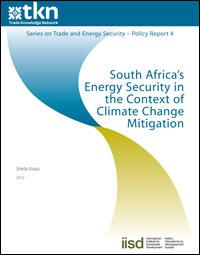| 来源类型 | Paper
|
| 规范类型 | 论文
|
| South Africa's Energy Security in the Context of Climate Change Mitigation |
| Sheila Kiratu
|
| 发表日期 | 2010-08
|
| 出版者 | IISD
|
| 出版年 | 2010
|
| 页码 | 28
|
| 语种 | 英语
|
| 概述 | Climate change science indicates that the South Africa has the "wrong" primary energy source—coal, which is a major source of carbon dioxide... |
| 摘要 |
Climate change science indicates that the South Africa has the "wrong" primary energy source—coal, which is a major source of carbon dioxide emissions. As such, there is an urgent need to diversify the country's energy sources away from the current high dependence on coal to renewable sources of power. This paper examines the challenges that the country faces and their implications for Southern Africa. Key Findings: South Africa will need to redefine its competitive advantage by moving away from energy-intensive sectors that rely on cheap but dirty electricity, and instead shift towards a new advantage centred on climate-friendly technologies and systems. South Africa needs to transform its institutional and regulatory environment to allow for the participation of clean electricity suppliers in a market currently dominated by coal and the national electricity utility. As pressure for transition to a low-carbon economy mounts, investment in low-carbon goods and services will continue to accelerate. Economies that are efficiently run and free from the volatility of the fossil fuel market are at a competitive advantage; consequently, companies and governments that are moving fastest towards a low-carbon economy will reap the rewards. While policy measures are in place to address energy and climate concerns in South Africa, they are undermined by policies in other areas of government. This lack of a coherent vision that includes all government departments results in fractured policies on energy and climate change. To develop an integrated vision for energy security, the South African government must address institutional issues, diversification, and also take into account the opportunities available in neighbouring countries.
Key Recommendations: The transition to a low-carbon economy in South Africa should be pursued concurrently with its other fossil fuel-based initiatives and not sequentially if the country is to secure its electricity supply and achieve the bold and exemplary commitment it made under the Copenhagen Accord. South Africa's energy policies need to be tackled in a coordinated way, as they lie at the heart of major national and international foreign policy discussions on matters that affect the country's and the wider region's energy security. The push toward decarbonization will be one of the major drivers of global and national economic growth over the next decade and South Africa's government and businesses need to stop viewing the transition to a low-carbon economy as a threat rather than an opportunity. If anything, as the most industrialized country in the region, the transition to a low-carbon society will provide a platform for the development of a clean-tech power generation industry and the creation of green jobs in South Africa.
|
| URL | https://www.iisd.org/library/south-africas-energy-security-context-climate-change-mitigation
|
| 来源智库 | International Institute for Sustainable Development (Canada)
|
| 资源类型 | 智库出版物
|
| 条目标识符 | http://119.78.100.153/handle/2XGU8XDN/57101
|
推荐引用方式
GB/T 7714 |
Sheila Kiratu. South Africa's Energy Security in the Context of Climate Change Mitigation. 2010.
|
|
文件名:
|
south_africa_energy_climate.jpg
|
|
格式:
|
JPEG
|

|
文件名:
|
south_africa_energy_climate.pdf
|
|
格式:
|
Adobe PDF
|
除非特别说明,本系统中所有内容都受版权保护,并保留所有权利。